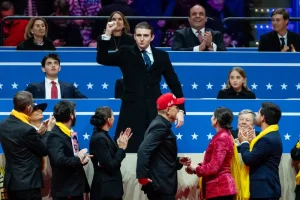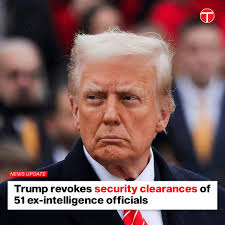Introduction
On July 23, 2018, then-President Donald Trump made a controversial decision to revoke the security clearances of 51 former intelligence officials, including high-profile figures like former CIA Director John Brennan and former Director of National Intelligence James Clapper. This move was widely seen as politically motivated, coming amid escalating tensions between Trump and the intelligence community over issues such as Russian election interference and the Mueller investigation.
This article provides a comprehensive analysis of the decision, its legal basis, the key figures involved, the political fallout, and the long-term implications for national security and government transparency.
Background: The Feud Between Trump and the Intelligence Community
1. The Russia Investigation and “Deep State” Accusations
Trump had long been at odds with the U.S. intelligence community, particularly after their assessment that Russia interfered in the 2016 election to help his campaign. He frequently dismissed these findings as a “hoax” and accused intelligence officials of being part of a “Deep State” conspiracy against him.
- Key Moment: In February 2018, Brennan criticized Trump’s performance at the Helsinki Summit with Vladimir Putin, calling it “treasonous.”
- Trump’s Response: He labeled Brennan a “political hack” and threatened to strip his clearance.
2. The “Enemies List” Controversy
In July 2018, the White House floated the idea of revoking clearances for multiple critics, including:
- John Brennan (Ex-CIA Director)
- James Clapper (Ex-DNI)
- James Comey (Ex-FBI Director)
- Michael Hayden (Ex-NSA & CIA Director)
- Sally Yates (Former Acting Attorney General)
- Susan Rice (Former National Security Advisor)
This was perceived as an attempt to silence dissent rather than a legitimate security concern.
The Decision: Why Revoke the Clearances?
1. Official Justification
The White House claimed the move was about “protecting national security” and preventing the “politicization of intelligence.” Press Secretary Sarah Huckabee Sanders stated:
“They’ve monetized their public service and security clearances, making baseless accusations of improper contact with Russia.”
2. The Real Motivation?
Many experts saw this as retaliation for:
- Public criticism of Trump’s handling of Russia.
- Support for the Mueller investigation.
- Allegations that Trump was compromised by foreign influence.
3. Legal Authority
- The president has broad authority to grant or revoke security clearances.
- However, using this power to target political opponents raised ethical and legal concerns.
Key Figures Affected
| Name | Former Role | Reason for Targeting |
|---|---|---|
| John Brennan | CIA Director (2013-2017) | Vocal critic of Trump’s Russia policy |
| James Clapper | Director of National Intelligence (2010-2017) | Supported Russia investigation |
| James Comey | FBI Director (2013-2017) | Fired by Trump, later criticized him |
| Michael Hayden | NSA & CIA Director | Criticized Trump’s authoritarian tendencies |
| Sally Yates | Acting Attorney General (2017) | Defied Trump’s travel ban |
| Susan Rice | National Security Advisor (2013-2017) | Accused of “unmasking” Trump associates |
Public and Political Reactions
1. Criticism from National Security Experts
- Former CIA Deputy Director Michael Morell: Called it a “dangerous precedent.”
- Sen. John McCain (R-AZ): Warned it was an “abuse of power.”
- Rep. Adam Schiff (D-CA): Accused Trump of “weaponizing security clearances.”
2. Support from Trump Allies
- Fox News commentators defended the move as “draining the swamp.”
- Rep. Devin Nunes (R-CA) claimed the officials had “abused their access.”
3. Media and Legal Analysis
- The New York Times: Editorial called it “an act of petty vengeance.”
- Lawfare Blog: Argued it could chill free speech among ex-officials.
Long-Term Implications
1. Erosion of Intelligence Community Norms
- Traditionally, ex-officials kept clearances to consult on national security matters.
- Revoking them politically could discourage future cooperation.
2. Precedent for Future Presidents
- Could a Democratic president revoke clearances of Trump allies in retaliation?
- Risks turning security clearances into a political weapon.
3. Impact on Government Transparency
- Former officials often provide media commentary based on their expertise.
- Losing clearances may limit their ability to speak accurately on classified matters.
Conclusion: A Politically Charged Decision with Lasting Consequences
Trump’s revocation of security clearances was unprecedented in modern U.S. history. While legally permissible, it blurred the line between national security and political retribution.
The move further deepened the rift between Trump and the intelligence community, setting a troubling precedent for how future administrations might treat dissent.
Key Takeaways:
✔ Targeted high-profile critics like Brennan and Clapper.
✔ Raised concerns about abuse of presidential power.
✔ Could have a chilling effect on free speech among ex-officials.
✔ Long-term impact on intelligence community norms remains uncertain.
References & Further Reading
- White House Statement on Security Clearances (2018)
- Brennan’s Response in The Washington Post
- Legal Analysis from Lawfare
Trump Revokes Security Clearances of 51 Former Intelligence Officials: A Deep Dive into the Political and Legal Implications









